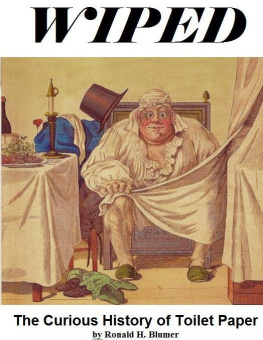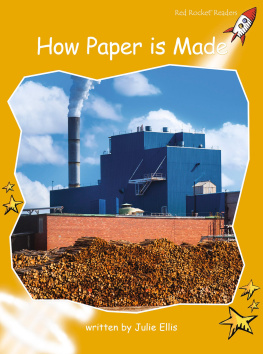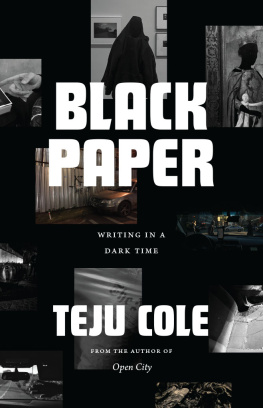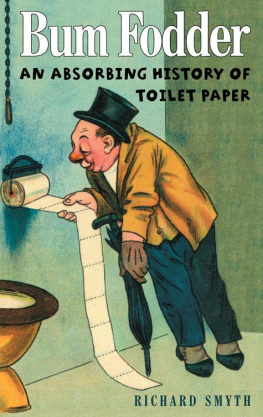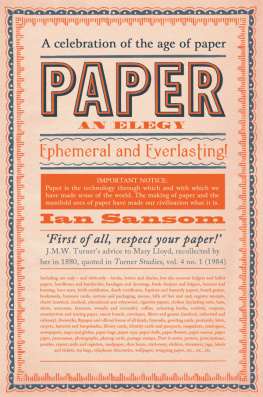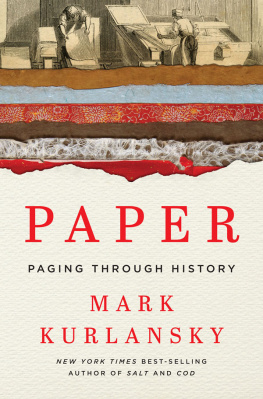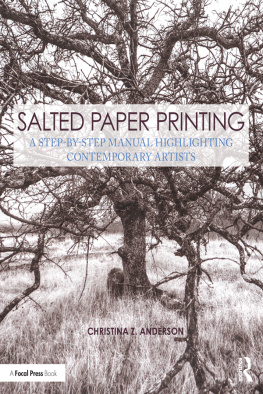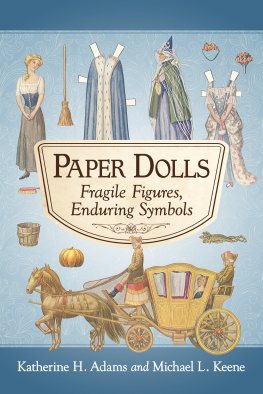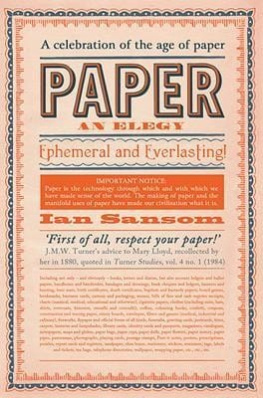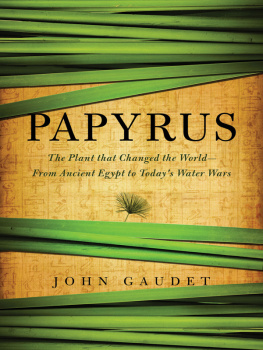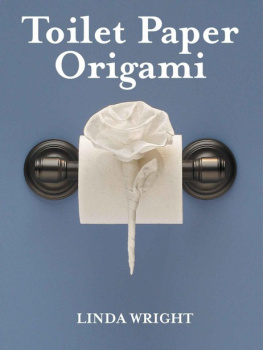WIPED

The Curious History of Toilet Paper
by Ronald H. Blumer
The Muses Recreation
Galen s old rules could not suffice,
Nor yet Hippocrates the wise.
Not teaching, how to dance, can do,
Themselves must come and wipe it too.
Here did li e Virgil, there lay Horace,
Which newly had wipe d his, or her arse.
Anacreon reeled too and fro,
Vexed, that they used his papers so.
Here lies the letter of a lover,
Which piecemeal did the thing discover.
S onnets half written would not stay,
But must necessity obey.
But then the pity to behold
Those ancient authors, which of old
Wrote down for us, p hilosophy,
Physick, music, and p oetry,
Now to no other purpose tend,
But to defend the fingers end.
Sir John Mennes (1599 -1671) & James Smith (1605 -1667)
FOREWORD

THE AUTHOR ON HIS MUSE
A s it has to many, the inspiration for writing a book came to me while I was sitting on the toilet. But not just any toilet. My wife and I were visiting Ephesus, the great port of the ancient Greek and Roman civilization located in present-day Turkey. Ephesus also was a stopping place for Saint Paul the apostle and perhaps the Virgin Mary, and the city where part of the New Testament was written. The toilet in question was in a 2000 year-old communal lavatory built by the Romans, conveniently located across from the citys brothel and up the street from the Library of Celsius, one of the greatest storehouses of knowledge of the ancient world.
Our guide invited our group to sit on some of these accommodations and then, in broken English and even more broken Japanese, lectured us on the wonders and niceties of Roman public lavatories. He described the running water under these facilities, the perfumed air, and the fountain in the center of the room. Musicians entertained the customers. It was a warm and friendly meeting place where citizens of Ephesus did their business while debating politics, philosophy, and the price of wine. The seats of this accommodation were made of marble, and the guide informed us that the patrons first would have one of their slaves sit on the spot to warm up the seat so their wealthy rear ends would not have to endure the shock of cold stone. Nice touch, I thought. The other thought I had (but was too shy to ask) was, How in an age long before paper, did they umwipe their patrician asses? I determined to look it up at our present-day Celsius library, the repository of all human knowledgeGooglethe moment I could get to an Ephesian Internet caf.
If you type ass wiping - history as a search term into Google you get millions of hits including many nasty sex sites but not much useful information. One site, discussanything.com, has more questions than answers and sent me to advertisements for hemorrhoid creamsthank you, Google. Another site, proving that there is absolutely everything on the internet, is called The Toilet Paper Museum . It turns out to be not a brick and mortar place but a virtual cyberspace entity created by a music group. The more I searched, the more sites I found dealing with the subject. The problem was that they all seemed to be copying the same superficial information over and over again, and much of this information was obviously wrong.
With the Internet having failed me, and now home from my Turkish toilet musings, I was determined to get to the bottom of this subject (all future puns unintended) by committing, in this wired age, what might be considered a last act of desperation. I decided to go to a book library.
Like Ephesus, New York City has a wonderful research library located on Fifth Avenue, also near one of the citys rare public lavatories (and Im sure a few brothels that I wouldnt know about). This Celsius is guarded by two imposing stone lions and has marble halls, and frescoed ceilings, and its bowels contain millions of original manuscripts, books, and periodicals. Rummaging through the librarys computerized catalogue, I came upon books and articles on toilets, water closets, middens, and privies, but I could not figure out a way of pulling from the librarys wealth of information the specific object of my curiosity. What I needed was a subject heading keyword, and there under the frescoed ceiling, beckoning me with a smiling face, was the friendly research librarian. I am a shy fellow and it took me some time to summon up the courage to approach the marble counter and ask in a quavering voice for the keyword that would unlock the secrets of ass wiping through the ages. The librarian, who I am sure will be regaling future dinner guests with, you arent going to believe this one!, accepted my unusual request with the dispassionate professionalism of a doctor or a priest and attempted to help me. Not only were there no books or papers on the subject, she informed me, the subject itself did not seem to exist. Well, said I, just give me the listing of all the books on toilet paper. I was hoping that in their introductions they would touch on pre-toilet paper history. There arent any, said the librarian, by now becoming a bit puzzled herself. Okay, then, said I, not on the history of toilet paper, just any book on the manufacturing and marketing of toilet paper, its a multi-billion dollar industry. There must be She interrupted me: Yes our library on Science and Industry is down the street but they too show no books at all having as their main subject, toilet paper. None!
A chill went down my back. With the myriad of PhD students combing the world for original topics no matter how obscure, with the thousands of authors and journalists scratching out a living trying to write about something new, with the millions of bloggers and tweeters expounding at length on every aspect of human existence, did they all miss this one staring them right in the face every morning? Could it be that Ihumble Ihad hit on a really fresh subject, one that had never been rigorously investigated in print? Was this like the region labeled terra incognita on antique maps? Would I be the first human to explore this unknown territory? I resolved to take the challengeto become the Columbus of butt cleaning.
What began as idle curiosity and, yes, a bit of a joke, has led me on a fascinating journey strewn with amazing facts and an odd, crescent-moon-shaped window on the past.
It also turned out to be among the hardest research I have ever done in a life of doing research, because not only are there very few written records about this most mundane of human activitiesthe raw material for historiansbut there seems to be an active avoidance of the subject. And then there was the search- term problem. What should I look for in the indexes or in periodical searches? The subject seems so forbidden that even the search terms are euphemisms of euphemisms: personal hygiene, elimination behavior, toilet etiquette, privies, close-stools, water closets, sanitary tissue.
Books of fiction were no help. It should not surprise the reader to learn that ass wiping (with one jaw-dropping exception) was not the subject of great literature. It is rarely mentioned in diaries and personal histories. Poets and song writers do not rhapsodize its delights. (But I did discover, to my surprise, that it is the subject of religious edicts.)
It seems that the whole subject of defecation has been largely ignored by academics. Perhaps the professional historians, sociologists, and anthropologists of the world suspected that writing about how we poop is not the surest road to tenure. My bookshelves groan with a twenty-four volume set of the Encyclopedia Britannica, but you will not find toilet paper in its 646 page index. The extensive and magnificently illustrated French series A History of Private Life is certainly not squeamish. It details sexual practices, masturbation, torture and death by disemboweling, but barely touches on latrines and contains not a word about toilet rituals throughout historyalthough this was obviously a significant aspect of private life. You will not find the subject discussed in any broad sweep history book although anal matters certainly did affect the rise and fall of civilizations. Hitler, Napoleon, and Chairman Mao all had rectal problems so severe that they occasionally interrupted their murderous careers. In 480 BCE, Xerxes Persian army of 800,000 conquered the Greeks but was brought down by dysentery, a disease spread by fecal contamination. Xerxes ultimately lost the war and we will never know how the history of the Western World would be different if the Persians had altered their bathroom habits. In 1414, the English beat the French at the Battle of Agincourt, but half of their longbow archers, suffering from diarrhea, had to fight the war naked from the waist down. Future generals would have to learn and relearn an uncomfortable fact: it is very difficult for man to focus on slaughtering his fellow man while he has the runs.
Next page
